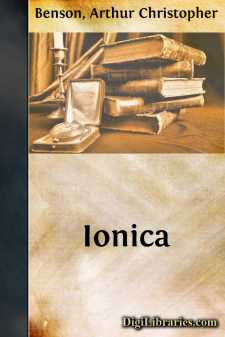Poetry
General Books
Sort by:
Preface At the earliest period concerning which we have any accurate information, about the sixth century A. D., Japanese poetry already contained the germ of its later development. The poems of this early date were composed of a first line of five syllables, followed by a second of seven, followed by a third of five, and so on, always ending with a line of seven syllables followed by another of equal...
more...
by:
David Morton
WOODEN SHIPSThey are remembering forests where they grew,—The midnight quiet, and the giant dance;And all the murmuring summers that they knewAre haunting still their altered circumstance.Leaves they have lost, and robins in the nest,Tug of the goodly earth denied to ships,These, and the rooted certainties, and rest,—To gain a watery girdle at the hips.Only the wind that follows ever aft,They greet...
more...
by:
Stephen Hawes
The prologue THe prudent problems / & the noble werkes Of the gentyll poetes in olde antyquyte Vnto this day hath made famous clerkes For the poetes Wrote nothynge in vanyte But grounded them on good moralyte Encensynge out the fayre dulcet fume Our langage rude to exyle and consume The ryght eloquent poete and monke of bery Made many fayre bookes / as it is probable From ydle derkenes / to...
more...
by:
Arthur Symons
BEING A WORD ON BEHALF OF PATCHOULI. AN ingenuous reviewer once described some verses of mine as "unwholesome," because, he said, they had "a faint smell of Patchouli about them." I am a little sorry he chose Patchouli, for that is not a particularly favourite scent with me. If he had only chosen Peau d'Espagne, which has a subtle meaning, or Lily of the Valley, with which I have...
more...
INTRODUCTION WILLIAM CORY (Johnson) was born at Torrington in Devonshire, on January 9, 1823. He was the son of Charles William Johnson, a merchant, who retired at the early age of thirty, with a modest competence, and married his cousin, Theresa Furse, of Halsdon, near Torrington, to whom he had long been attached. He lived a quiet, upright, peaceable life at Torrington, content with little, and...
more...
THE SINGING MAN I He sang above the vineyards of the world. And after him the vines with woven handsClambered and clung, and everywhere unfurled Triumphing green above the barren lands;Till high as gardens grow, he climbed, he stood, Sun-crowned with life and strength, and singing toil,And looked upon his work; and it was good: The corn, the wine, the oil. He sang above the...
more...
SIGNELIL The Lady her handmaid to questioning took:“Why dost thou so sickly and colourless look?” But sorrow gnaws so sorely! “’Tis little wonder if sickly I’m growing, Malfred my lady!So much am I busied with cutting and sewing.” “Erewhile was thy cheek as the blooming rose red,But now thou art pale, even pale as the dead.” “To conceal the truth longer ’tis vain to essay,My...
more...
INTRODUCTION The method of the poems in A Shropshire Lad illustrates better than any theory how poetry may assume the attire of reality, and yet in speech of the simplest, become in spirit the sheer quality of loveliness. For, in these unobtrusive pages, there is nothing shunned which makes the spectacle of life parade its dark and painful, its ironic and cynical burdens, as well as those images with...
more...
by:
Thomas Burke
Buying and Selling Throughout the day I sit behind the counter of my shop And the odours of my country are all about me— Areca nut, and betel leaf, and manioc, Lychee and suey sen, Li-un and dried seaweed, Tchah and sam-shu; And these carry my mind to half-forgotten days When tales were plentiful and care was hard to hold. All day I sell for trifling sums the wares of my...
more...
BAYBERRY CANDLESDear sweet, when dusk comes up the hill, The fire leaps high with golden prongs;I place along the chimneysill The tiny candles of my songs. And though unsteadily they burn, As evening shades from grey to blueLike candles they will surely learn To shine more clear, for love of you. SECRET LAUGHTER"I had a secret...
more...











